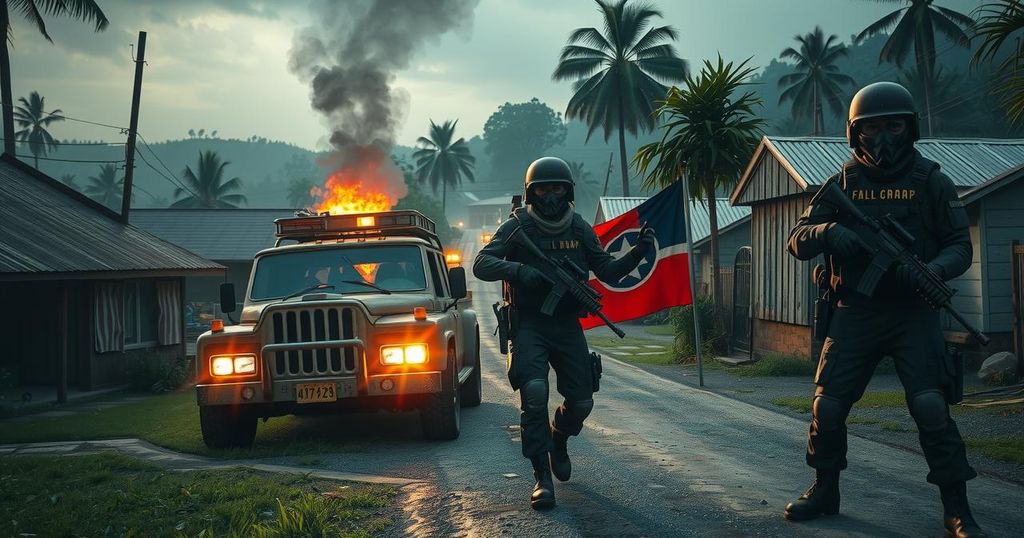Rwanda-backed rebels, specifically the M23 group, have seized the town of Masisi in eastern DR Congo, marking their second capture in two days. This escalating conflict has led to severe humanitarian concerns and reflects ongoing instability in the mineral-rich North Kivu province. Despite mediation attempts, tensions between Rwanda and the DRC remain high as the M23 continues to exert control over significant regions.
Rwanda-supported rebel forces have recently taken control of the town of Masisi in the eastern Democratic Republic of Congo (DRC), as confirmed by various reports. This marks the second town seized by the M23 group within a span of just two days in North Kivu province, a region abundant in minerals. The M23 has been consolidating its grip on significant portions of eastern DRC since 2021, resulting in the displacement of hundreds of thousands of residents.
Efforts by Angola to foster mediation talks between the Congolese President Félix Tshisekedi and Rwandan President Paul Kagame collapsed last month. Reactions to the situation have been grave, with Alexis Bahunga, a member of the North Kivu provincial assembly, expressing deep concern, stating, “It is with dismay that we learn of the capture of Masisi centre by the M23.” He cautioned that this development plunges the area into a severe humanitarian crisis and urged for an enhancement of military capacities in the region.
A local resident relayed to the AFP news agency that the M23 convened a meeting with the town’s inhabitants, declaring their mission as one of liberation. With a population of approximately 40,000, Masisi is the capital of the corresponding territory and lies around 80 kilometers north of Goma, the provincial capital that the M23 momentarily occupied in 2012. On Friday, the M23 also captured the neighboring town of Katale.
Concerns regarding the M23’s advances have resurfaced, especially since last year when there were apprehensions that the group would target Goma, a city of two million people. After an initial lull in hostilities, fighting resumed in December. Notably, Rwanda has not refuted a UN report indicating the presence of about 4,000 Rwandan soldiers supporting the M23 in DRC, attributing the ongoing violence partly to the Congolese government’s failure to address historical conflicts in the eastern regions. Furthermore, Rwanda has previously accused the DRC government of collaborating with individuals implicated in the 1994 Rwandan genocide against ethnic Tutsis and moderate Hutus.
Originally formed as an offshoot of another rebel group, the M23 emerged in 2012, ostensibly to safeguard the Tutsi population from historical persecution. However, critics of Rwanda argue that the Rwandan government is exploiting the M23 to pilfer valuable mineral resources, including gold, cobalt, and tantalum—minerals essential for electronics production. In light of the conflict over these so-called “blood minerals,” the DRC recently initiated legal action against Apple, alleging the company has benefited from these resources, leading Apple to announce a cessation of supplies from the nation.
The Democratic Republic of Congo has experienced prolonged instability primarily due to persistent conflicts fueled by ethnic tensions and disputes over resource control. The M23 rebel group, established in the early 2010s, has claimed to advocate for the rights of the Tutsi minority but is often accused of being a proxy for Rwanda, seeking to exploit the country’s rich mineral resources. The DRC’s North Kivu province, where the latest fighting has erupted, remains a hotspot for conflict, displacing thousands of people intermittently over the years as rebel groups vie for control and influence. Recent mediation efforts by neighboring countries, including Angola, have highlighted the complex dynamics at play between regional actors.
The seizure of Masisi by Rwanda-backed rebels underscores the ongoing turmoil in the eastern Democratic Republic of Congo, raising alarms over a looming humanitarian crisis and intensifying calls for government intervention. The persistent resurgence of the M23 group illustrates the necessity for strategic diplomatic engagements to stabilize the region and address the underlying issues driving the conflict. It is imperative for regional and international stakeholders to prioritize peace-building efforts and explore viable solutions to mitigate the suffering of local populations affected by violence and displacement.
Original Source: www.bbc.co.uk






